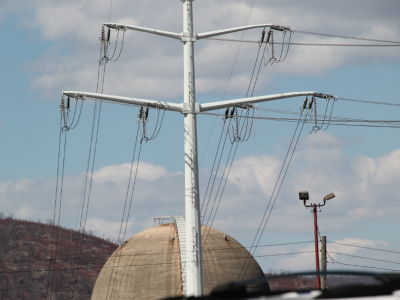
On March 11, an 8.9-mag- nitude earthquake hit the northeast coast of Japan, triggering a massive tsunami that destroyed much of the surround- ing land, including the Fukushima Daiichi nuclear power plant.
The natural disaster caused a power outage at the plant, which in turn shut off the reactors’ cool- ing systems used to prevent the nuclear fuel from overheating or melting down, releasing nuclear radiation into the air that could affect people within a 50 mile radius of the plant.
Indian Point Energy Center is a three-unit nuclear power plant in Buchanan, N.Y. – a mere 50 miles northwest from Westport. After the recent events in Japan, many wonder will this type of disaster happen here?
In short, the answer is that it is very unlikely.
Diane Screnci, Senior Public Affairs officer at the Nuclear
Regulatory Commission (NRC), concurs and believes that a cata- strophic meltdown, resembling that of the Fukushima Daiichi plant, would be highly unlikely at the Indian Point Energy Center.
The NRC carries out inten- sive inspections on all U.S. power plants, including Indian Point. According to its website, the in- spection is a comprehensive ex- amination that makes sure “that the organizational structure, operator qualifications, design, maintenance, fuel handling, and environmental and radiation pro- tection programs are adequate and comply with NRC safety re- quirements.”
Screnci said that each power plant is designed to withstand the largest natural disaster that has occurred in the area with an additional margin of error includ- ed. She then compared the local power plant to those in Florida. “Florida plants have been hit by big hurricanes and while they have lost power, like Fukushima did, public health and safety were
not affected.” Likewise, the Indian Point plant is safe.
But due to the Fukushima di- saster, the NRC is in the process of creating new regulations to ensure the plants’ safety and se- curity.
Jacob Meisel ’13, creator of the Connecticut Weather Web- site (CTWW), agrees, saying that although an earthquake is pre- dicted to occur on the Northeast within the next decade or two, a tsunami would not take place due to Westport’s protection from the Long Island Sound.
“We should be sheltered from the worst of any tsunami unless it came in at a perfect angle, which is extremely unlikely,” Meisel said.
However, another form of a natural disaster, such as a hur- ricane, is more probable for the Northeast and could be a potential cause of destruction for a nuclear power plant.
“There stands a chance that we do get a really bad hurricane in the next decade or two. Luck- ily, while hurricanes can be really
bad, they will likely not affect any nuclear reactors, as they are made to withstand hurricanes,” Meisel said.
However, if the extremely unlikely event were to occur, how ready would Staples be?
Unfortunately, the school would not be prepared, due to the fact that iodine pills are no lon- ger kept at the nurses’ office; this decision was made by the Public Health Initiative (PHI), though, not the school.
According to school nurse, Libby Russ, the pills were issued to the school by the PHI after 9/11 but later taken away because there is no apparent need for them, due to the fact that Westport is not in immediate danger of a radioactiv- ity exposure.
In the event of poisonous ra- diation being in the air, Iodine pills are taken to block the thyroid gland from taking up the radioac- tivity.
“When public health or emer- gency management officials tell the public to take iodine pills fol-
lowing a radiologic or nuclear event, the benefits of taking this drug outweigh the risks. This is true for all age groups,” Mark Coo- per, Director of Health at the West- port/Weston Health District, said.
However, they require an ar- duous process to maintain.
“It wasn’t a prudent plan to keep in place. It involved a lot of work, such as getting a signed per- mission slip from every parent in the school, which was hard to do. It wasn’t the best use of the nurses time,” Russ said.
As of now, it is clear that West- port is in no immediate danger of radioactivity; however there is still an emergency response plan in place in the case of the improb- able.
Cooper states that Westport has plans in place “for a variety of potential emergency situations, including those involving a ra- dioactive leak, whether said leak was from Indian point or a traf- fic accident on I-95 involving the transportation of radioactive ma- terials.”













































